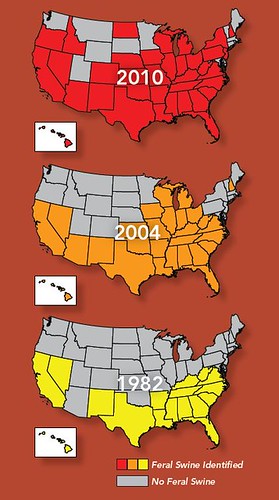
Wild boar, razorback, feral hog, wild pig — these are just some of the names we attribute to one of the most destructive and formidable invasive species in the United States. Feral swine adapt to just about any habitat, have few natural enemies, and reproduce at high rates. As such, their population is growing rapidly nationwide. At 5 million animals and counting, feral swine are now found in at least 39 States and cause approximately $1.5 billion in damages and control costs each year. Their damage is diverse and includes destroying native habitats and crops, eating endangered species, and spreading disease. Natural resource managers, researchers and academics nationwide are grappling with how best to address the challenges of feral swine management.
Feral swine are hunted by the public in some States for recreational purposes; but hunting will not solve our country’s feral swine problems.
“Feral swine don’t know boundaries and what happens in one State affects neighboring States,” states APHIS’ new national feral swine initiative coordinator Dr. Dale Nolte. “Only through a concerted, comprehensive effort with the public and our State and Federal partners can we begin to turn the tide on feral swine expansion and reduce their negative impacts to our economy and environment.”
The USDA and it partners hope to accomplish just that. In 2014, APHIS Wildlife Services received $20 million from Congress to begin a collaborative, national feral swine management initiative with APHIS Veterinary Services and International Services, as well as numerous local, State, and Federal partners. The goal of the initiative is to prevent the further spread of feral swine, as well as reduce their population, damage, and associated disease risks. Though management efforts will occur in many different locations and habitats throughout the United States, these actions will be modified and adapted to best meet the needs and objectives of each State. The initiative will be highlighted at the 2014 International Wild Pig Conference in Montgomery, Alabama, on April 14-16. For more information, please visit the APHIS feral swine web page.
April is Invasive Plant, Pest, and Disease Awareness Month. Learn more about APHIS Wildlife Services activities related to invasive wildlife.
